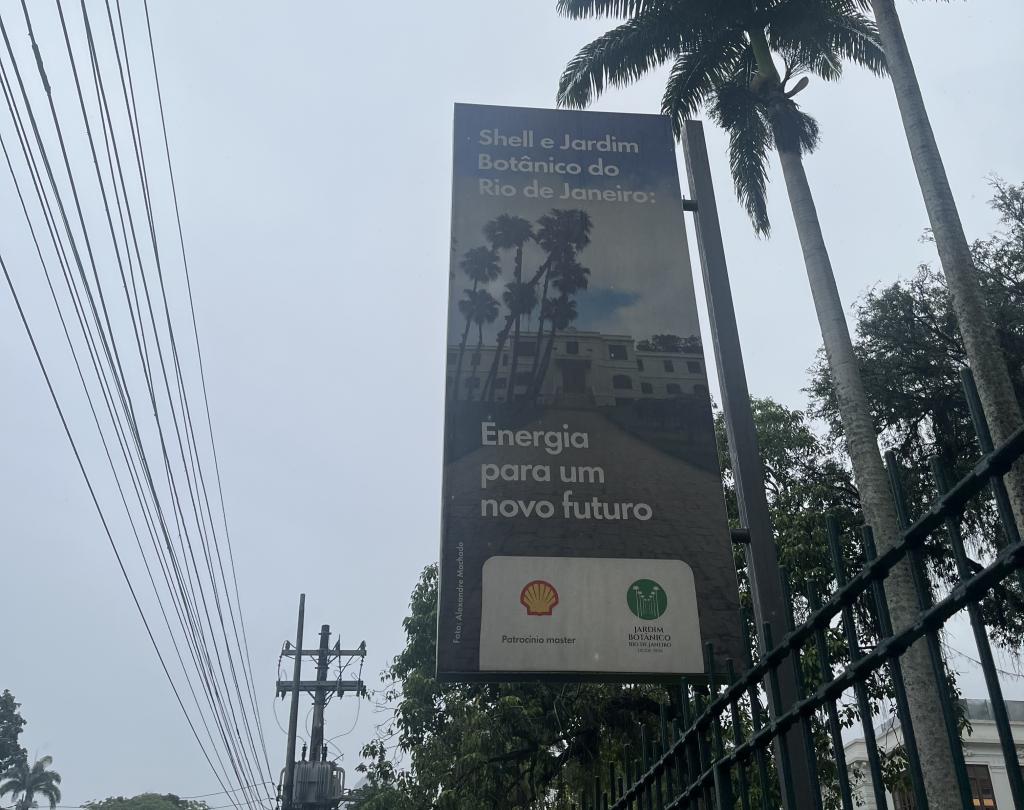A day at the Rio Jardim Botânico: Shell’s garden of greenwashing?

The G20 team is left scratching their heads at why a beautiful natural wonder would carry the branding of an oil major.
Ah, Shell. Tax-dodging extraordinaires who could put even the mighty Gary Barlow to shame. “Dubious” “reckless” and “evil” are just a few of the names the multi-billion-dollar oil giant has been called over the years. But here’s an intriguing one: official sponsor of the Rio de Janeiro Botanical Gardens.
In the lead-up to this year’s G20 summit, Brazil has championed sustainability and environmental concerns as central themes, positioning itself as a leader in global climate and ecological agendas. But reconciling lofty ambitions with tangible action remains a significant challenge, particularly when balancing short-term energy demands against long-term climate goals.
From a domestic perspective, Brazil has attempted to integrate more green energy solutions into its policy framework in recent years, with President Lula recently calling for an end to deforestation by 2030, and a new National Energy Transition Policy that promises R$2 trillion in green investment with hydropower as its top source of electricity. However, challenges remain in curbing the country’s fossil fuel reliance, which still accounts for over half of its energy consumption. Overall, Brazil is still invested heavily in hydrocarbons – they dominate its energy panorama – with Lula planning to bump the country up from the seventh to the fourth largest oil producer by 2030. In short, an avowed environmentalist President faces a difficult paradox when it comes to environmental policy.

This precarious balancing act is on full display in Rio, where the city has received a R$12 million investment from Shell to restore the Botanical Garden Museum. Shell’s website describes this partnership as a testament to their “commitment to sustainable development, environmental education, and the appreciation of Rio’s unique biodiversity”. But this rhetoric can appear to fall flat in a country where Shell has long been linked to environmental devastation, from its history of oil spills to its involvement in the destruction of the Amazon rainforest and the displacement of Indigenous populations. This move has greenwashing written all over it, and in a city where Christ the Redeemer is watching over all, readers might question whether a huge oil company with a market cap of $200 billion can absolve itself of its corporate sins so easily and cheaply.
Despite presenting the company as a sustainability advocate – other local greenwashing initiatives include Amazonian reforestation and biofuel production – behind the scenes Shell’s team has been working to reverse a 2021 Dutch court ruling which would have forced emissions curbs. This was a landmark case, marking a move towards legally binding corporations to the carbon emission limits of the 2015 Paris Climate Agreement, and reflecting the wider emergence of ‘climate litigation’. Yet Shell’s recent appeal of this case, right on time for the G20 and COP29, marked a complete backtrack of environmental accountability, instead prioritising profits over sustainability goals.
Inside the Rio botanical gardens, the dichotomy is impossible to miss: monkeys swing through the trees, blissfully indifferent to the Shell-branded signage encircling their habitat. The mansion’s 19th-century walls gleam with fresh restoration, but this polish does little to obscure Shell’s tarnished environmental legacy, including its role in the destruction of ecosystems that once sustained many of the monkeys’ wild counterparts.
Beyond the garden walls, Shell’s impact in Rio seems even thinner. The investment underscores a troubling disconnect between glossy cultural preservation efforts and the city’s unaddressed environmental and social crises. Whilst they describe the renovation of the Botanical Garden Museum as “a gift to locals and tourists alike”, even a monkey could see that the funds would be better placed addressing Brazil’s real, urgent challenges—e.g. supporting communities affected by deforestation and investing in clean water access for Rio’s most vulnerable populations.
A botanical facelift won’t cleanse Shell’s climate sins, nor will it suffice to make up for the damage inflicted by decades of resource exploitation. You can’t fix an oil spill with a coat of fresh paint—or a garden sponsorship.
G20 Team: Alicia Sear-Acinas, Amelia Eveleigh, Ethan Ryan, Gregory Stiles, Grzegorz Stal, Madeleine Fearn, Matthew Bishop, Imogen Parry, Scarlett Vickers, Shengyao Guo.
Photo by Anthony 🙂


